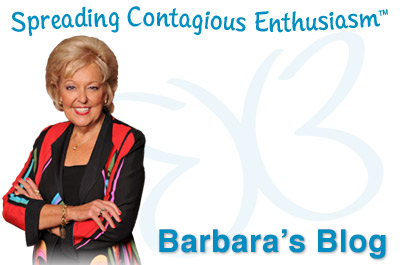A Choice in every Interaction
By Barbara A. Glanz
“Every person can make a difference, and every person should try.” -John F. Kennedy
I have been deeply touched by Victor Frankl’s book, Man’s Search for Meaning, based on his experiences in several concentration camps during World War II. What he found in the camps was that even under the most horrible of conditions, each man or woman had a choice in their reactions. Even though the external conditions were the same, some people reacted as saints, giving their last piece of bread to a dying person, and others as swine, ripping the bread out of the dying person’s mouth because they were too weak to fight back.
He says:
“Everything can be taken from a man but one thing: the last of the human freedoms–to choose one’s attitude in any given set of circumstances, to choose one’s own way.”
So, even though we cannot control the external circumstances of our lives, we each have a choice in our response to them. The overriding theme of all my speaking and writing is that we all have choices, beginning with each interaction we have with anyone. We can create a minus, a zero, or a plus for that person. I have created a little three column chart with a minus (-) column, a zero (0) column, and a plus (+) column with the heading ¹YOUR CHOICE IN ANY INTERACTIONœ that I use as a simple, yet powerful visual to communicate this choice in an observable, measurable way. I often tell my audiences the following true stories of how that simple model and the concept of choice is actionable in my life:
I fly every week in my work of professional speaking. Recently, I was in O’Hare Airport. Before I boarded my flight, I quickly stopped in the women’s restroom. The first thing I saw as I entered was a lady who was cleaning. She was all hunched over, almost robotlike, simply going through the motions of her job. There was no spirit or sense of purpose in anything she was doing.
I walked up to her, gently touched her on the arm, and said, “Thank you so much for keeping this washroom clean. You are really making a difference for all of us who travel.”
She immediately perked up, stood up taller, and began to do her cleaning with a renewed passion and a huge smile. As I was leaving, I noticed that she was even handing out paper towels to all the women who were washing their hands. In one single comment from a complete stranger, she had found a reason for being!
Some weeks later I was speaking at the Hyatt Regency Hotel in Chicago. My husband and I were having lunch after my presentation. As the young man who was our waiter served us, I noticed his name badge said “Mario.” After he had been at our table several times, I said to him, “Mario, you have a beautiful smile. It makes everyone happier to see you.” He immediately pulled back his shoulders, stood up very tall, and beamed back, “You can just call me ‘SUPER MARIO’!” And, as we watched the rest of the time we were there, he WAS “Super Mario!”
As I tell my audiences, those simple little stories illustrate in such a powerful way the wonderful choices each one of us has every day to make a difference in this world–and it doesn’t matter how much stress and change we are experiencing, what our jobs are, or what others around us are doing. We still have the awesome choice of recognizing those around us as HUMAN BEINGS with value and dignity and purpose. That, I think, is the underlying mission of our work here on earth.
When I speak to a group, I ask them not to think of what they’re doing as a job or a set of skills, but rather to think about what is their “work”–how is what they do every day making somebody’s life better. That is their very important work, and it doesn’t matter if you clean the toilets or run the company, you can find a way that you are making a difference for someone.
After he returned to normal life, Frankl began to study in more depth man’s need for meaning. A study sponsored by the National Institute of Mental Health and administered by Johns Hopkins University interviewed 7948 students at 48 colleges, asking them what was “very important” to them. 16% responded “Making a lot of money.” 78% responded that their first goal was “Finding a purpose and meaning to my life.” As my stories illustrate, whether our interaction is with the clerk in the checkout line at the grocery store, the toll booth collector, a colleague, a customer, or a family member, this is the gift we can give to them–to choose to recognize, affirm, and appreciate the difference they are making in this world!
For more inspiring articles by Barbara Glanz, visit www.barbaraglanz.com/articles.


